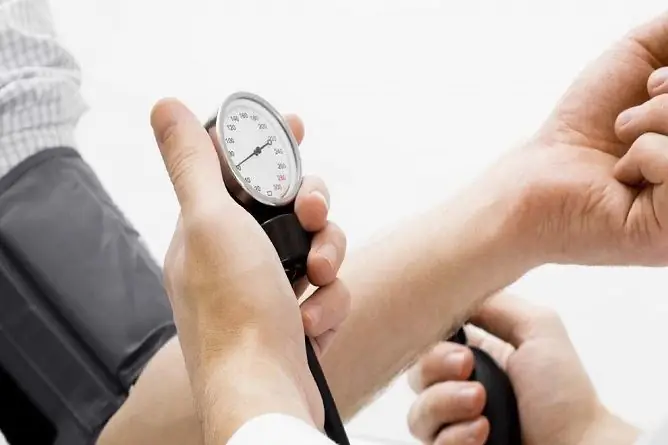High blood pressure: symptoms of high blood pressure in women and men, causes, treatment of pathology
The content of the article:
-
High blood pressure symptoms in men and women
Signs of a hypertensive crisis
- Blood pressure is normal and its deviations
- Causes and risk factors for the development of arterial hypertension
- First aid
- Diagnostics
- Hypertension treatment
- Video
Symptoms of high blood pressure in women and men may be absent for a long time; in some cases, patients learn about the presence of this pathology only with the development of the first hypertensive crisis.
The danger of a prolonged asymptomatic or low-symptomatic course of arterial hypertension is that in the absence of timely, correctly selected treatment, the patient's blood vessels deteriorate, which contributes to the development of a number of complications that can cause complete or partial disability, disability, and sometimes death. Arterial hypertension can lead to heart failure, myocardial infarction, stroke, chronic cerebrovascular accident, renal failure, visual impairment, erectile dysfunction, arrhythmia.

High blood pressure symptoms do not depend on gender, the main one is headache
It is advisable for people from risk groups to consult a doctor who will explain how high blood pressure manifests itself, what to do with the development of pathology and how to reduce the indicator at home.
High blood pressure symptoms in men and women
The symptoms of hypertension are not gender dependent. The first signs of high blood pressure often do not attract the patient's attention. The main symptom of pathology is an increase in blood pressure (BP).
There are 3 degrees (stages) of arterial hypertension. With grade 1 hypertension, the blood pressure level rises to 140-159 / 90-99 mm Hg. Art., for hypertension of the 2nd degree - 160-179 / 100-109 mm Hg. Art., with hypertension 3 degrees - from 180/110 mm Hg. Art. and more.
Symptoms of high blood pressure are: headache (may be aching, squeezing), dizziness, increasing weakness, lethargy, general deterioration of health, flashing of flies before the eyes, nausea and vomiting, excessive sweating, hyperemia of the skin of the face, swelling of the limbs and face, memory impairment and attention, pain in the heart. Chest pain can radiate to the left arm - the detection of this symptom is a reason to immediately consult a doctor. Cold snap and / or numbness of the fingers, sleep disturbances, and increased urine production at night (nocturia) are common.
Shortness of breath often occurs, which is initially observed during physical exertion, and with the progression of the pathological process, it also occurs at rest. Other signs of high blood pressure in a person include a throbbing sensation in the head, tinnitus, and anxiety. Nose bleeding may occur. Often, visual impairments are observed, which in some patients become irreversible.
With symptomatic arterial hypertension, pain in the lower back, dysuria can be added to the main signs of high blood pressure.
Signs of a hypertensive crisis
In a hypertensive crisis, a sharp increase in blood pressure occurs, manifested by a sharp headache, flushing of the skin of the face and chest, tinnitus, severe nausea and vomiting, cold sweat, high pulse, feeling of lack of air, anxiety. Consciousness may be impaired.
Once the crisis has developed, it tends to relapse.
A hypertensive crisis can be uncomplicated or complicated. In the second case, it is especially important to provide medical assistance to the patient as soon as possible. A hypertensive crisis can be complicated by retinopathy, heart failure, disseminated intravascular coagulation syndrome, edema of the brain, lungs, renal failure and other life-threatening conditions.
Blood pressure is normal and its deviations
Blood pressure is the pressure exerted by blood on the vessels as it moves through the bloodstream. High blood pressure (arterial hypertension, hypertension) is one of the most common pathologies of the cardiovascular system, which occurs in all age groups of the population. A significant proportion of cases of high blood pressure are associated with hypertension (essential, primary hypertension), in other patients symptomatic arterial hypertension is diagnosed.
Blood pressure is considered normal for adults, which is 120/80 mm Hg. Art. slight deviation up or down. The first value shows the systolic (upper) pressure, the second - the diastolic (lower).

The ideal blood pressure for an adult is 120/80 mm Hg. Art.
According to statistics, hypertension is recorded in 20-30% of adults. Most often, it develops in men at the age of 40-60, but recently, more and more arterial hypertension occurs at the age of 30-32, and even in younger patients. In persons over 65 years old, high blood pressure is detected in 50-65% of cases. In this age category, the incidence of pathology does not depend on gender.
The pressure in an adult is normally slightly higher than that of a child. Typically, for children under 10 years of age, pressure up to 110/70 mm Hg is normal. Art., and for children over 10-11 years old - up to 120/80 mm Hg. Art. Primary hypertension occurs in about 10% of hypertensive patients under 10 years of age. Symptomatic arterial hypertension is much more common in this age group. During puberty (in girls, on average, it starts from 12 to 13 years old, and in boys - at 13-14 years old), so-called adolescent hypertension may occur, which is not considered a pathology. There are usually no symptoms. However, in about 30% of children, blood pressure does not return to normal after 3-7 years, and in some cases it even rises, which is a reason to see a doctor.
Causes and risk factors for the development of arterial hypertension
Physiological increase in blood pressure occurs throughout the day, during physical exertion, stressful situations. In this case, it quickly returns to normal.
The use of certain drugs and natural stimulants can lead to an increase in blood pressure.
Contribute to the development of arterial hypertension: genetic predisposition, the presence of endocrine diseases, disorders of the nervous, cardiovascular system, kidneys, osteochondrosis of the cervicothoracic spine, insufficient rest and night sleep, malnutrition (the presence of a large amount of saturated fatty acids in the diet, excessive the use of table salt), magnesium deficiency in the body, a passive lifestyle, overweight, bad habits, industrial hazards.
The symptoms of high blood pressure in women often appear during menopause and during pregnancy.
The likelihood of developing arterial hypertension depends on the quality of the water consumed, the microclimate in the living room, the effect on the body of electromagnetic and / or sound fields. In cities, hypertension is more common than in rural areas.
First aid
If a person has a high blood pressure, first aid is to seat the patient, putting several pillows under his back, provide fresh air, and release clothes that are compressing the body. If a doctor has prescribed drugs that can be used in such a case, they should be given to the patient. If the person's condition does not improve, it is necessary to seek medical help. In case of a hypertensive crisis, an ambulance should be called.
Diagnostics
To make a diagnosis, they collect complaints and anamnesis, measure blood pressure (in some cases, daily monitoring of pressure is needed). Laboratory tests of blood and urine, X-ray diagnostics, electrocardiographic examination, ultrasound diagnostics, ophthalmological examination are carried out.

Complex diagnostics of hypertension includes an electrocardiogram
Differential diagnosis of hypertensive crisis is carried out with panic attacks, vegetative crisis, angina pectoris attack, thyrotoxic crisis. In pregnant women, a hypertensive crisis is differentiated from preeclampsia and eclampsia. Regular preventive medical examinations play an important role in detecting hypertension.
Hypertension treatment
At the initial stages of the development of arterial hypertension, it can be eliminated by correcting the lifestyle.
Recommendations are to follow a diet limiting salt, fatty foods and other heavy foods, as well as spicy and pickled foods. It is recommended to include fish, bananas, cabbage, tomatoes, strawberries, carrots, garlic, raisins, dairy products in the diet.
Shown are daily walks in the fresh air, an adequate regime of work and rest, avoidance of stressful situations, rejection of bad habits, correction of body weight, sufficient physical activity. To optimize physical activity, children over 5 years old and adolescents are recommended to moderate aerobic activity for at least 30 minutes a day.
Drug treatment of arterial hypertension, depending on its etiology, may include the appointment of diuretics, angiotensin-converting enzyme inhibitors, calcium channel blockers, vasodilators. Depending on the indications, the drugs are used in monotherapy or in combinations.
With a hypertensive crisis, alpha-blockers, beta-blockers, antiadrenergic drugs, diuretics, antipsychotics, etc. can be prescribed.
Video
We offer for viewing a video on the topic of the article.

Anna Aksenova Medical journalist About the author
Education: 2004-2007 "First Kiev Medical College" specialty "Laboratory Diagnostics".
Found a mistake in the text? Select it and press Ctrl + Enter.







